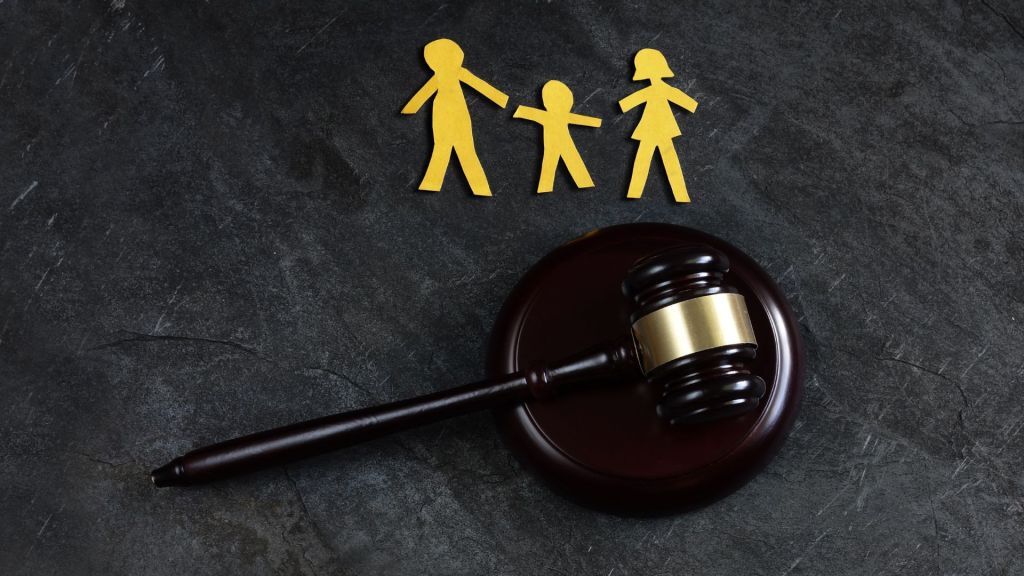Types Of Visitations

Visitation, also known as parenting time, is the time that a non-custodial parent spends with their child. It is an important aspect of custody arrangements, as it allows for the maintenance of parent-child relationships even when parents live apart.
There are several types of visitation arrangements that can be made in family law, each with its own advantages and disadvantages. In this blog post, we will explore some of the most common types of visitation in family law.
Unsupervised visitation
Unsupervised visitation is the most common type of visitation in family law. It allows the non-custodial parent to spend time with their child without any supervision or monitoring. This type of visitation is typically granted when the court believes that the non-custodial parent does not pose a risk to the child’s safety or well-being. Unsupervised visitation can be on a regular schedule or at the discretion of the non-custodial parent.
Supervised visitation
Supervised visitation is a type of visitation in which the non-custodial parent is allowed to spend time with their child, but only under the supervision of a designated third party. The third party can be a family member, friend, or professional supervisor. Supervised visitation is typically ordered when the court believes that the non-custodial parent poses a risk to the child’s safety or well-being, such as in cases of abuse, neglect, or addiction.
Virtual visitation
Virtual visitation is a type of visitation that allows the non-custodial parent to communicate with their child through video calls, emails, or other electronic means. Virtual visitation is often used in cases where the non-custodial parent lives far away from the child or has limited physical access to the child.
Therapeutic visitation
Therapeutic visitation is a type of visitation that is designed to address specific issues or problems in the parent-child relationship. Mental health professionals supervise the visits to help improve the relationship between parent and child and address any underlying problems.
Grandparent visitation
Grandparent visitation is a type of visitation that allows grandparents to spend time with their grandchildren. In cases where the court believes that maintaining a relationship with grandparents is in the best interests of the child, grandparents’ visitation is often ordered.
Visitation is an important aspect of custody arrangements in family law. It is important for parents to work with their attorneys to determine the best type of visitation arrangement for their situation while keeping the best interests of the child in mind.
Lawyer Russell A. Spatz has helped countless people in Florida with their family law needs. He takes the time to listen to your concerns, so he can provide the guidance that you need to achieve a better future for your family.
To arrange a consultation with Russell Spatz, call 305-442-0200 or contact him online.
How Is Alimony Decided

Divorce is a difficult process, both emotionally and financially. One of the major concerns for many couples going through a divorce is the issue of alimony, which refers to the financial support provided by one spouse to the other after the marriage has ended.
In Florida, alimony is determined based on a variety of factors, including the length of the marriage, the financial resources and earning capacity of each spouse, and the standard of living during the marriage.
Types of Alimony
Florida law recognizes several different types of alimony, including:
- Temporary alimony: This type of alimony is awarded during the divorce process and is meant to help the lower-earning spouse cover expenses while the divorce is pending.
- Bridge-the-gap alimony: This type is awarded to help a spouse transition from being married to being single. It is typically awarded for a short period, usually less than two years.
- Rehabilitative alimony: This is awarded to help a spouse become self-sufficient. It may be awarded to help a spouse obtain the education or training needed to get a job or start a business.
- Durational alimony: This is awarded for a set period and is typically awarded in marriages of moderate length.
- Permanent alimony: This is awarded in marriages of a long duration and may continue until the death of either spouse or until the receiving spouse remarries.
Factors Considered in Determining Alimony
When determining the amount and duration of alimony, Florida courts consider several factors, including:
- The length of the marriage: Depending on the length of marriage, the longer the marriage, the more likely it is that alimony will be awarded.
- The financial resources of each spouse: This includes income, assets, and earning capacity.
- The standard of living during the marriage: The court will consider the lifestyle the couple enjoyed during the marriage. It will also consider whether it is reasonable to expect both spouses to maintain that standard of living after divorce.
- The age and health of each spouse: The court will consider the physical and emotional health of each spouse and whether either spouse has any special needs.
- The contributions of each spouse to the marriage: This includes both financial and non-financial contributions, such as caring for children or supporting a spouse’s career.
- Any other factors the court considers relevant: The court has the discretion to consider any other factors that it deems relevant to the determination of alimony.
In addition to these factors, Florida law requires the court to consider whether either spouse committed adultery during the marriage. However, this is not necessarily a determining factor in the award of alimony.
If the spouse who committed adultery is the one requesting alimony, their behavior may be taken into consideration by the court. Adultery can be seen as a breach of trust and may be viewed as a factor in reducing or denying alimony payments as well as the impact the affair had on their financial well-being and adjusting the amount and duration of the alimony payments.
If you are going through a divorce and have questions about alimony, it is important to speak with an experienced family law attorney who can help you understand your rights and options under Florida law.
Lawyer Russell A. Spatz has helped countless people in Florida with their family law needs. He takes the time to listen to your concerns, so he can provide the guidance that you need to achieve a better future for your family.
To arrange a consultation with Russell Spatz, call 305-442-0200 or contact him online.
Sources:
https://www.lawhelp.org/dc/resource/frequently-asked-questions-about-alimony
https://www.justia.com/family/divorce/alimony-forms-50-state-resources/
How Adoptions Work In Florida

Adoption is a wonderful way for families to grow and for children to find a loving and permanent home. Florida is a popular state for adoptions due to its large population and diverse communities.
Types Of Adoptions
Let’s discuss the different types of adoptions available in Florida. There are several types of adoptions that can take place including:
Foster Care Adoptions: This type of adoption involves children who have been removed from their biological parents’ care due to abuse or neglect. The goal of foster care adoption is to provide a permanent and loving home for these children.
Private Adoptions: This type of adoption involves an adoption agency or a private attorney who works with the birth parents and adoptive parents to place a child in a new home.
International Adoptions: This type of adoption involves the adoption of a child from another country. International adoptions can be complex and require compliance with the laws of both the sending and receiving countries.
Adoption Steps
The next step in the adoption process is to find an adoption agency or attorney that can help with the adoption process. It is important to research and choose an attorney that is reputable and experienced. After choosing an agency or attorney, the next step is to complete the necessary paperwork and background checks. This may include a home study, financial documentation, and criminal background check.
Once the paperwork is complete, the attorney will work to match the adoptive parents with a child. This process can take several months or even years, depending on the type of adoption.
After a child is matched with the adoptive parents, the final step of the process is next, a finalization hearing will take place in court, which will make the adoption legal and permanent.
It’s important to note that the laws and regulations for adoption in Florida are constantly evolving, so it’s always a good idea to consult with a professional and stay informed about any changes. Additionally, adoption can be a long and emotional process, so it’s important to be prepared for everything you will have to face.
Lawyer Russell A. Spatz has helped countless people in Florida with their family law needs. He takes the time to listen to your concerns, so he can provide the guidance that you need to achieve a better future for your family.
To arrange a consultation with Russell Spatz, call 305-442-0200 or contact him online.
Termination Of Parental Rights

Parental rights are the obligations that parents have on their children, boys, girls, or adolescents, as well as their assets.
The moment you become a mother or father, your paternity or maternity is legally recognized through the birth certificate, automatically and without the need for a judicial decision, you acquire parental authority over your child (your person and your assets ).
Legal Rights As A Parent
Within parental authority, parents have the right over their children to:
- The right to child custody and visitation.
- The right to inheritance.
- The right to make important decisions about education, religion, healthcare, and other aspects of the child’s life.
- The responsibility to pay child support.
- The responsibility for the child’s misconduct.
Termination Of Parental Rights
Parental rights can be terminated voluntarily or involuntarily in any one of the following situations
- Abandonment
- Neglect or cruelty
- The parent was convicted of a felony
- The parent is mentally disabled
- The parent is disabled due to moral depravity or substance abuse.
- The parent is mentally ill or developmentally disabled.
Once a parent’s rights are terminated, they no longer have the right to see or speak to the child or take part in decisions that impact the child’s life. Likewise, they can’t be liable for the child’s actions. So, you must think twice before you decide to end your parental rights.
In cases of separation or divorce, the parental authority of the parents continues to be shared in terms of their ownership, but it can, and is most frequent, that it is the parent with whom the children live, who assumes the custody function the one who effectively exercises parental authority, but for certain acts joint exercise of parental authority by both spouses is required, such as emancipation, assuming extraordinary expenses not covered by alimony, important decisions for the formation of the minor, etc.
Lawyer Russell A. Spatz has helped countless people in Florida with their family law needs. He takes the time to listen to your concerns so he can provide the guidance that you need to achieve a better future for your family. He handles all types of family law matters, has decades of experience, and knows Florida’s legal system through and through.
Give him a call today at 305-442-0200 or contact the firm online.
Common Mistakes During a Divorce

Unfortunately, divorces are becoming more common among couples today. Every 13 seconds, there is one divorce in America. That equates to 277 divorces per hour, 6,646 divorces per day, 46,523 divorces per week, and 2,419,196 divorces per year.
Putting an end to a marriage is a very difficult time for anyone. In this process, there is a need to try to overcome the emotional damage that the separation of the relationship entails in itself, plus other feelings that are at stake. Many times, this process can also involve fights, anger, disagreements, and many other things that can make you lose your mind.
People in this process have a tendency to make mistakes that, in addition to delaying the divorce process, can completely harm the outcome.
Here we leave you the 4 most common mistakes that you should avoid in your divorce process
Acting Out Of Anger, Revenge, Or Guilt.
Acting without being carried away by feelings is very difficult in these situations, but it is extremely important that when you feel like this, you reconsider and do not make decisions without thinking because the consequences can turn against you, and at the end of the day, the only one who will lose is you.
Not Obtaining Quality Legal Advice
Many times, the divorce process can become very complicated due to everything that is involved and the different opinions. We know that many people have gone through the divorce process, but it is better not to accept advice from anyone other than the lawyer who is committed to your case. Only a professional will know what is best for your case.
Not Being Completely Honest With Your Attorney
It is extremely important that you share with your lawyer all the necessary information for the processing of your case, since the lawyer in charge of your case will only be able to work with what you provide. If you hide or lie about something to your lawyer, your case could be hurt by the other side.
Refusing to Negotiate
It is evident that during the process, not everything will turn out as you wish. It is important that you are open to the possibility of negotiating what is best for your case; this also includes reaching agreements requested by the lawyer with your partner. For this reason, it is also important that you maintain communication and do not refuse to continue communicating with your partner, since if this is not the case, your case could be harmed.
Lawyer Russell A. Spatz has helped countless people in Florida with their family law needs. He takes the time to listen to your concerns so he can provide the guidance that you need to achieve a better future for your family. He handles all types of family law matters, has decades of experience, and knows Florida’s legal system through and through.
Give him a call today at 305-442-0200 or contact the firm online.
What To Look For In A Family lawyer

A family lawyer is the one who is in charge of the regulation, measurement, and management of legal processes that are linked to family relationships.
There are many qualities that a family lawyer must have since their cases require them to be very human since they are not only dealing with one person but with decisions that can affect an entire family.
A family lawyer intervenes in many legal matters, some of them such as:
- Marriage procedures
- Prenuptial agreements
- Divorces
- Adoptions
- Inheritances and wills
To exercise this position, it is essential that your family lawyer be full of various qualities in order to have an impeccable performance of his work and that this does not lead your case to defeat. Here we will mention to you the most important ones that it must comply with.
Empathy Is Indispensable
Empathy is virtue in the field of Family Law. Regularly, cases in family law have a fairly large emotional load. The lawyer must be able to understand your needs and feelings and treat them objectively so that they do not lose their sense of justice, as well as the feelings of everyone involved. It is also very important that the lawyer have high emotional intelligence, as this will lead to good results.
Specialization and Experience
Remember that it is always essential to hire a lawyer who specializes in the matter in which your problem is. Most of all, if you need to go to court or if your case is very complicated,
Communication Skills
Your family lawyer’s priority should be to facilitate the exchange of opinions and the creation of common agreements, avoiding misunderstandings and, especially, avoiding tension; their communication skills will be critical in this matter.
Now that you know the fundamental aspects and qualities that a family lawyer must comply with, it is time to choose the best. A lawyer who you can build a relationship of trust, who is aware of the follow-up of your case, and one who not only cares about obtaining a benefit from the case but also cares about you and seeks to help you in all aspects.
Lawyer Russell A. Spatz has helped countless people in Florida with their family law needs. He takes the time to listen to your concerns so he can provide the guidance that you need to achieve a better future for your family.
No matter what family law issue you are facing, attorney Russell Spatz can help. To arrange a time to discuss your issue with him, please call the Spatz Law Firm, PL, at 305-442-0200 or contact the firm online.
How Does Child Custody Work?

Obtaining custody of your children means having their care, companionship, and legal control. When two people choose to divorce, the issue of children is very important as it can often become complicated. Everything will depend on the posture and behavior of the parents and how they decide to carry out this process. There are some parameters when talking about the custody of a child, such as who chooses it and what types of custody exist. Here we will talk a little about each of these parameters.
How Many Types Of Custody Are There?
At the time of divorce, one of the parents does not necessarily have to be left alone to care for their children. There are several types of custody depending on the case of the parents, such as:
1. Joint Custom
It is the child custody arrangement in which each parent has custody rights. They have equal control over decisions regarding a child’s upbringing and split the time that a child spends living with each of them. This custody is more focused on making legal decisions for the child.
2. Shared Custody
The number of contacts the child has with each parent determines the custody arrangement. Basically, shared custody aims to give the parents the opportunity to split the time that the child physically lives with them as close to 50/50 as possible. This is a subtype of joint custody.
3. Sole Custody
This custody consists of just one of the parents being able to live with the child and having legal authority over him. The other parent may have some rights, but the important decisions made about the child belong to the parent who gets custody. No matter if the other parent disagrees, what the custodial parent says will always be done.
4. Split Custody
This refers to the type of custody where both parents remain with one or more children in the family. For this type of custody to be approved, it must be based on an agreement between the parents since it is preferred that the children remain together for their development.
When deciding custody, several parties are involved in it. Many times, the court will not interfere if there is already an agreement between the parents. This is the fastest, easiest, and cheapest way to take the case. Parents must sign this agreement for everything to be supported. But, if the parents cannot reach an agreement, the court will have to interfere, and they will have the last word in the decision of this process, always looking for what is best for the children.
Lawyer Russell A. Spatz has helped countless people in Florida with their family law needs. He takes the time to listen to your concerns so he can provide the guidance that you need to achieve a better future for your family. He handles all types of family law matters and has decades of experience and knows Florida’s legal system through and through.
Give him a call today at 305-442-0200.
Cohabitation Agreements in Florida
Also referred to as a domestic partnership agreement, a cohabitation agreement in Florida is a legally binding document founded on contract law that establishes financial stability before a couple decides to combine their lives and assets. The aim of such an agreement is to protect both individuals in the event of a breakup by outlining how they should handle matters including assets, property, child support, debts, and/or alimony payments. The agreement also ensures the couple can resolve their issues out of court.
Cohabitation agreements in Florida are suitable for any couple who does not wish to get married but is still seeking the same rights afforded to married couples. Couples looking to keep their assets, property, and/or debts separate from their partners may also seek a cohabitation agreement.
Unmarried couples have the option of creating several legal documents that can help protect their rights as a couple while at the same time safeguarding their interests and assets. Since unmarried couples who live together may one day split up, especially outside of the legal bonds and social institution of marriage, it makes sense to plan to avoid future conflicts.
Subject Matter of Cohabitation Agreements
The legal requirements for a valid cohabitation contract are much like the requirements for any valid contract. A valid agreement will be comprehensive to avoid disputes relating to an aspect of the couple’s life together unaddressed by the contract. Some of the aspects of the couple’s life together a cohabitation agreement might cover include:
- The distribution of property in case of death or breakup.
- Financial support during or after the relationship.
- The division of the principal residence upon death or breakup.
- The creation of a joint tenancy with right so survivorship, or adding a partner’s name to a deed.
- Support, custody, or visitation rights for minor children, though this is easily rejected or modified by a court, which can decide differently based upon the best interests of the child.
- Determination of health care insurance responsibility.
- The creation of advanced health care directives or health power of attorneys to allow partners to make decisions for each other in case of incapacity.
Two documents that may be used in place of, or in addition to, a cohabitation agreement are wills and durable powers of attorney. These documents, like a cohabitation agreement, can help ensure that the individual’s wishes are carried out if they die or become incapacitated. Wills direct how a person’s estate will be distributed after they die. This is important because an unmarried partner is usually not entitled to anything at all under the laws of intestate succession that control how property is inherited when someone dies without a will.
Durable powers of attorney allow someone to act and make decisions on your behalf if you become legally incompetent to manage your own affairs through illness or accident. Unmarried partners typically have no right to decide important health or financial matters in such situations without a power of attorney.
If you have any questions or concerns about Florida cohabitation agreements you may want to consult with a Florida attorney. Attorney Russell Spatz has over four decades of experience.
To meet with Attorney Russell Spatz to discuss your criminal matter, please call the Spatz Law Firm, PL, at 305-442-0200.
The basics of domestic violence in Florida
Under Florida law, Domestic Violence is defined as assault or battery, aggravated assault or battery, sexual assault, sexual battery, stalking, aggravated stalking, kidnapping, false imprisonment, or any criminal offense resulting in physical injury or death, committed by a family or household member against another family or household member.
Under Section 741.28, Florida Statutes, the term ‘family or household member’ can include the following:
- Current or former spouses.
- Persons related by blood or marriage.
- Persons currently or formerly residing together as if a family, or
- Parents who have a child in common, (regardless of prior marriage).
- With the exception of parents who have a child in common, the persons must currently or previously have resided together in the same single dwelling unit in order to be considered a family or household member under Florida law.
You can file for an injunction for protection against domestic violence in the circuit where you live permanently or temporarily, where the abuser lives, or where the abuse occurred. When you and the abuser live in different states, the judge may not have “personal jurisdiction” (power) over an out-of-state abuser. This means that the court may not be able to grant an order against him/her.
Even if you have not been physically battered, you can still qualify for an injunction if the judge believes you are in immediate danger of becoming a victim of domestic violence.
Domestic Battery is classified as a first degree misdemeanor with penalties that may include up to one year in jail or twelve months of probation,during which time the defendant must attend a batterers’ intervention program. and a $1,000 fine.
In domestic battery cases where the alleged victim does not wish to pursue charges, the parties should seek to immediately modify any No-Contact Orders that have been imposed by the court. This is accomplished through the filing of a Motion to Modify Conditions of Release.
In many cases, it is appropriate for a defendant and/or victim to be proactive and voluntarily enroll in counseling or other psychological or substance abuse services.
Domestic Violence Battery is a serious charge with potentially devastating consequences for the accused. If you are charged with a domestic violence offense or are accused of domestic violence, it is imperative to have a professional and experienced attorney on your side. Attorney Russell Spatz has over four decades of experience. To meet with Attorney Russell Spatz to discuss your criminal matter, please call the Spatz Law Firm, PL, at 305-442-0200.
Family: What is Sole Custody?

If you’re going through a divorce and have children together, you’ve probably heard the terms “joint custody” and “sole custody” before. These phrases, however, are frequently misunderstood. In the U.S., child custody can be “joint”, where the child is able to stay with both parents on separate days, or “sole”, where the child stays with one parent instead. All custody decisions are made by the court and are in the best interests of the child.
It is also worth noting that Sole Custody is defined in two ways:
- Sole Legal Custody: Where one parent has the right and responsibility to make major decisions regarding the child’s welfare, including matters of education, medical care, and emotional, moral, and religious development.
- Sole Physical Custody: Where the child resides with and under the supervision of one parent, subject to reasonable visitation by the other parent unless the court determines that such visitation would not be in the best interest of the child.
A sole custody agreement may have some advantages, such as not having to rely on the other parent to make important decisions for the child’s life, such as medical, educational, or religious choices. However, can also be a disadvantage since it may create conflict within your family.
It is important to note that gaining Sole Custody does not have an effect on the other parent’s right to visitation. That being said, another benefit of having a Sole Custody Agreement is that in the event that the other parent was violent or had a history of substance abuse, visitations from then on would be timed as well as supervised by a social worker.
Depending on what the court says, there may be some reasons why the judge would rather have a sole custody agreement instead of a joint custody agreement, which include:
- The parent has a drug or alcohol abuse problem that impairs his/her ability to care for the child.
- There are allegations of domestic violence or child abuse or a past history of domestic violence.
- The parent is living with someone that could pose a threat or harm to the child.
- The parent suffers from demonstrated psychological problems.
- The parent is an established flight risk with the child.
- There are allegations of neglect by the parent.
- The parent has not been a part of the child’s life until very recently.
- The parent cannot provide a safe, stable home for the child.
If you find yourself facing divorce and in need of help to obtain a Sole Custody, you need a professional attorney on your side. Russell Spatz, of the Spatz Law Firm, PL, has decades of experience handling serious criminal and family law cases. Contact him at 305-442-0200 to discuss your case.
 Russell A. Spatz, Esq. has been practicing law for over 35 years. Having served as an Assistant State Attorney and Division Chief to two State Attorneys, Richard E. Gerstein, (1975) and Janet Reno, (1978), Russell A. Spatz, understands the complexities that are involved in defending a criminal case, and how to put his knowledge and experience to work for his clients as their trial lawyer. Make an appointment today for a consultation with Attorney Russell Spatz. (305) 442-0200
Russell A. Spatz, Esq. has been practicing law for over 35 years. Having served as an Assistant State Attorney and Division Chief to two State Attorneys, Richard E. Gerstein, (1975) and Janet Reno, (1978), Russell A. Spatz, understands the complexities that are involved in defending a criminal case, and how to put his knowledge and experience to work for his clients as their trial lawyer. Make an appointment today for a consultation with Attorney Russell Spatz. (305) 442-0200